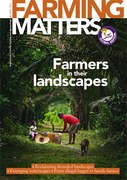Million Belay tells the story of how Aman Mame reads his landscape, and uses it to explain how social memory provides the context for responding to ecosystem change.
His name is Aman Mame. He reads the landscape as a mullah reads the Koran or as a high priest reads the Bible. We were on the second day of a participatory mapping exercise in a small village called Horo Soba overlooking the Bale Mountains in Ethiopia. I asked three teachers to each draw an eco-cultural calendar, a circular seasonal representation showing how culture, climate, nature and livelihood responds to each season.
The teachers divided the year into four seasons. But Aman Mame divided his into five. The teachers were shocked, and upset by their authority being challenged. But Aman explained his five seasons and showed how life in the landscape and his livelihood activities fit and respond to each, cultural aspects of how they welcome the coming seasons, and how the climate speaks to them.
Afterwards one of the teachers said “I was born here, but I saw places on his map that I did not know and I now feel like a total stranger. We need to teach this to our children.” Aman Mame replied, “you must know your land and remember your past. When the past is forgotten, the opportunity is lost for the present. Recalling the past will help us meet today’s challenges and those yet to come.” His community is now taking part in a social process to revive their past, compare it to the present and carry what is valuable to them to the future.
Social memory provides context for social response to ecosystem change, which is important during periods of crisis, and increases the likelihood of flexible and adaptive responses. As memory provides the framework of accumulated experience for coping with change, the mobilisation of memory through mapping has assisted local people to improve their resilience.
This collective memory is under assault in Africa. The new generation is substituting their memory of their landscape and the stories of their parents and ancestors, with the thought that they have no attachment to the land. Rural children spend hours arguing about European football clubs and players, and a generation with lost memory is easy prey for consumer culture. They have no patience and want everything now, and this has proved so detrimental to our landscape. This insatiable desire for the new and gratifying is tearing the social fabric in Africa and leaving its ugly mark on the landscape. To save it, we must remember our past.
Million Belay
Million Belay is the director of the Movement for Ecological Learning and Community Action (MELCA), Ethiopia, and the coordinator of the Africa Food Sovereignty Alliance. Dr Belay is our columnist throughout 2014.
Email: millionbelay@gmail.com

